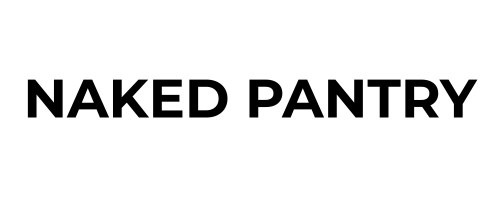
Top Compostable Food Packaging Solutions for a Greener 2025
Share
Why Choose Compostable Food Packaging?
Concerned about the environmental impact of your food's packaging? This listicle presents eight leading compostable food packaging options for 2025. Discover how these tools offer a sustainable alternative to traditional plastic, reducing landfill waste and promoting a healthier planet. Learn about key features and drawbacks of options like Naked Pantry, WorldCentric, and Eco-Products, enabling you to choose the best compostable food packaging for your needs.
1. Naked Pantry: Revolutionizing Your Pantry with Compostable Food Packaging
In a world increasingly aware of the detrimental impact of plastic pollution, finding truly sustainable food packaging solutions is paramount. Naked Pantry emerges as a beacon of hope, offering a revolutionary subscription service that delivers 100% plastic-free pantry staples directly to your doorstep. This makes them a standout choice for individuals seeking to minimize their environmental footprint while prioritizing their health. From grains to snacks, Naked Pantry curates a selection of organic and non-GMO groceries, ensuring every item arrives in compostable food packaging, eliminating plastic from the supply chain to your home. This commitment to sustainability addresses the growing concern over microplastics and harmful chemicals like BPA and phthalates leaching into our food, water, and ultimately, our bodies. These chemicals have been linked to various health issues, including inflammation, endocrine disruption, and metabolic disorders. Naked Pantry provides a proactive solution, offering peace of mind for health-conscious consumers.
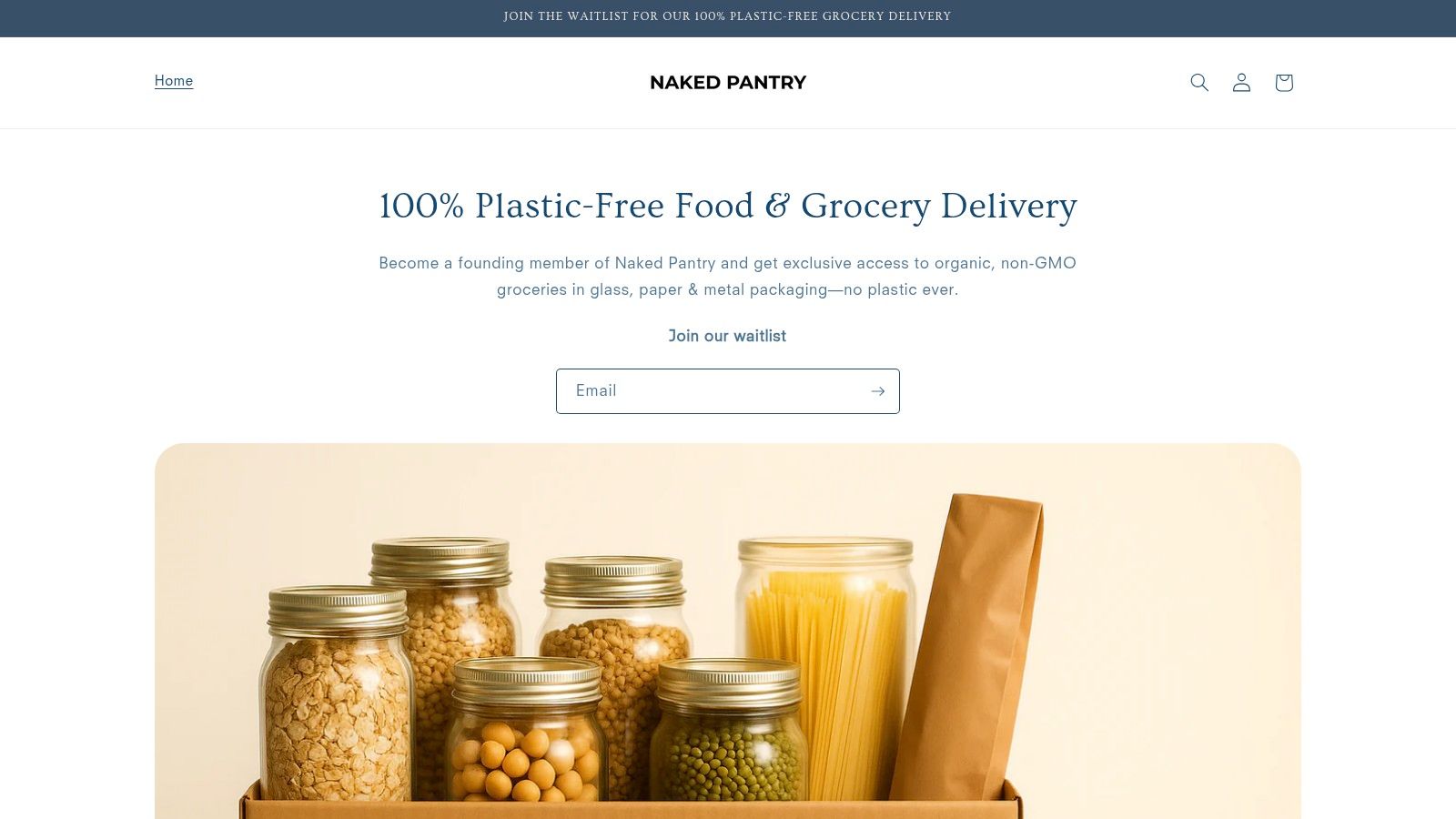
Naked Pantry's dedication to compostable food packaging extends beyond simply using paper. They utilize a combination of compostable paper, reusable glass jars, and durable metal tins, ensuring a truly zero-waste approach. This multifaceted approach allows for a wider variety of pantry staples to be packaged sustainably. Think beyond just dry goods – imagine receiving nut butters in reusable glass jars or spices in recyclable metal tins. This comprehensive strategy sets Naked Pantry apart from conventional grocery delivery services that often rely heavily on single-use plastics. Their focus on reusable and recyclable materials fosters a circular economy model, significantly reducing waste and its impact on landfills and ecosystems.
For those committed to clean eating, Naked Pantry offers a curated selection of organic and non-GMO products, with a preference for ingredients sourced from US-grown farms. This commitment to quality ensures you're not only protecting the environment but also nourishing your body with wholesome, ethically sourced food. This resonates with the growing consumer demand for transparency and traceability in the food supply chain. By partnering with trusted eco-brands, Naked Pantry guarantees that each product aligns with their stringent standards for sustainability and quality.
The convenience of a subscription model further enhances the Naked Pantry experience. Regular deliveries of your essential pantry staples directly to your door eliminate the need for trips to the grocery store, saving you time and effort. This streamlined approach to grocery shopping simplifies meal planning and preparation, making healthy eating more accessible and sustainable. While specific pricing details are not readily available, the subscription model suggests a structured approach to purchasing, potentially offering cost savings through bulk ordering or membership benefits. It’s worth joining the waitlist to gain access to pricing information and explore the various subscription options.
Naked Pantry’s current limitation is the waitlist requirement for new members. While this indicates high demand and a commitment to providing a quality service, it means immediate access to their product offerings isn't available. However, joining the waitlist positions you to be among the first to experience this innovative approach to sustainable grocery shopping. Being on the waitlist also offers the potential for exclusive early-bird discounts or promotions.
Pros:
- 100% Plastic-Free Packaging: Utilizing compostable paper, glass jars, and metal tins eliminates plastic contamination.
- Focus on Organic and Non-GMO: Prioritizes health and sustainability with US-sourced ingredients.
- Convenient Subscription Model: Simplifies grocery shopping with direct-to-door delivery.
- Addresses Environmental and Health Concerns: Tackles the issues of microplastics and endocrine-disrupting chemicals.
- Appeals to a Diverse Audience: Caters to eco-friendly, health-conscious, zero-waste, and clean-eating communities.
Cons:
- Waitlist Required: Immediate ordering and delivery are not currently available.
- Pricing Not Publicly Disclosed: Budget-conscious shoppers may need to inquire about pricing details.
Naked Pantry represents a significant step towards a more sustainable and health-conscious food system. By prioritizing compostable food packaging and focusing on organic, non-GMO products, they offer a compelling solution for those seeking to align their values with their consumption habits. Visit their website to join the waitlist and learn more: https://www.nakedpantry.co
2. WorldCentric Compostable Takeout Containers
For businesses and individuals seeking truly eco-friendly takeout solutions, WorldCentric compostable takeout containers stand out as a leading choice in the world of compostable food packaging. These containers offer a practical and effective way to reduce your environmental impact without compromising on functionality or food safety. They represent a significant step towards a more sustainable future for the food service industry and individual consumers alike. WorldCentric's commitment to plant-based materials and certified compostability makes them a powerful tool for those striving for zero-waste living and a cleaner planet.
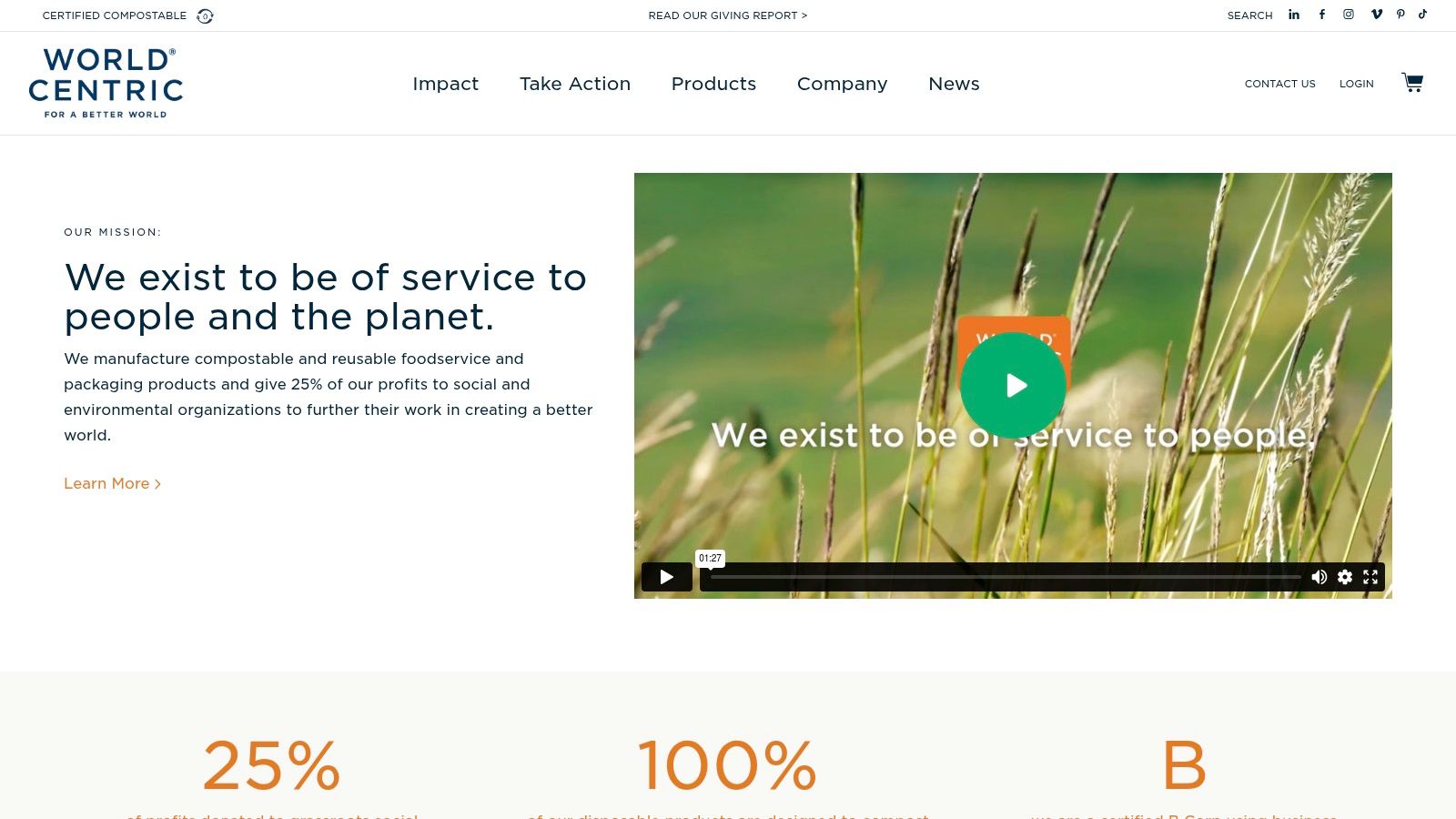
WorldCentric offers a diverse range of compostable food packaging, primarily focusing on takeout containers. These containers are crafted from a blend of renewable plant-based materials, including bagasse (a byproduct of sugarcane processing), wheat straw, and PLA (polylactic acid, a bio-based plastic derived from plants like corn). This commitment to sustainable sourcing distinguishes WorldCentric from competitors who may use less eco-friendly materials. The use of plant-based resources helps to reduce reliance on petroleum-based plastics, minimizing the carbon footprint associated with traditional food packaging.
A key advantage of WorldCentric's offerings is their adherence to rigorous compostability standards. These containers are certified compostable by both the Biodegradable Products Institute (BPI) and meet the ASTM D6400 standard, ensuring they break down completely into organic matter in commercial composting facilities within 90-180 days. This certification is crucial for consumers and businesses seeking genuine compostable food packaging solutions, as it guarantees the products will decompose properly under the right conditions. It’s important to note, however, that these containers require commercial composting and are not suitable for home composting systems.
WorldCentric containers are designed with practicality in mind. They offer excellent resistance to grease and moisture, preventing leaks and maintaining food integrity. This is a significant advantage over some other compostable options that may become soggy or degrade quickly with oily or liquid foods. They are also microwave and freezer safe within specific temperature ranges, offering versatility for both reheating and storing food. Sizes range from 8oz to 64oz, catering to a wide array of food service needs, from individual portions to larger family-style meals.
For businesses looking to implement compostable food packaging, WorldCentric offers several advantages. Their established brand reputation and reliable supply chain ensure consistent product availability and quality. Bulk ordering options provide competitive pricing, making the switch to eco-friendly packaging more financially viable. Furthermore, their clear labeling helps educate consumers about the compostability of the containers, encouraging proper disposal and maximizing the environmental benefits. This consumer education component is essential for building a successful composting program.
While WorldCentric offers a compelling solution for sustainable food packaging, it's essential to consider the potential drawbacks. The primary limitation is the requirement for commercial composting facilities. These containers will not break down in home compost bins or landfills. Therefore, businesses and consumers must have access to appropriate composting infrastructure to fully realize the environmental benefits. Additionally, while the containers are generally durable, they can become soggy with very hot or liquid foods over extended periods. Finally, the cost of compostable containers is typically higher than traditional plastic alternatives, which can be a barrier for some businesses.
For those committed to environmentally responsible practices, WorldCentric's compostable takeout containers present a strong option. They offer a practical and effective way to minimize the environmental impact of food service operations and individual consumption. By choosing these containers, businesses and consumers can actively contribute to a more sustainable future, reducing reliance on fossil fuels and promoting responsible waste management. You can explore their full product line and learn more about their commitment to sustainability on their website: https://www.worldcentric.com.
3. Eco-Products Renewable & Compostable Food Packaging
For businesses seeking a reliable and comprehensive solution for compostable food packaging, Eco-Products stands out as a leader in the industry. They offer a vast selection of plant-based foodservice products, from containers and cups to plates and utensils, all designed to minimize environmental impact. This makes them an excellent choice for eco-conscious businesses and consumers looking to reduce their reliance on traditional plastic packaging. Their commitment to using renewable resources and adhering to strict compostability standards makes them a top contender in the compostable food packaging market.
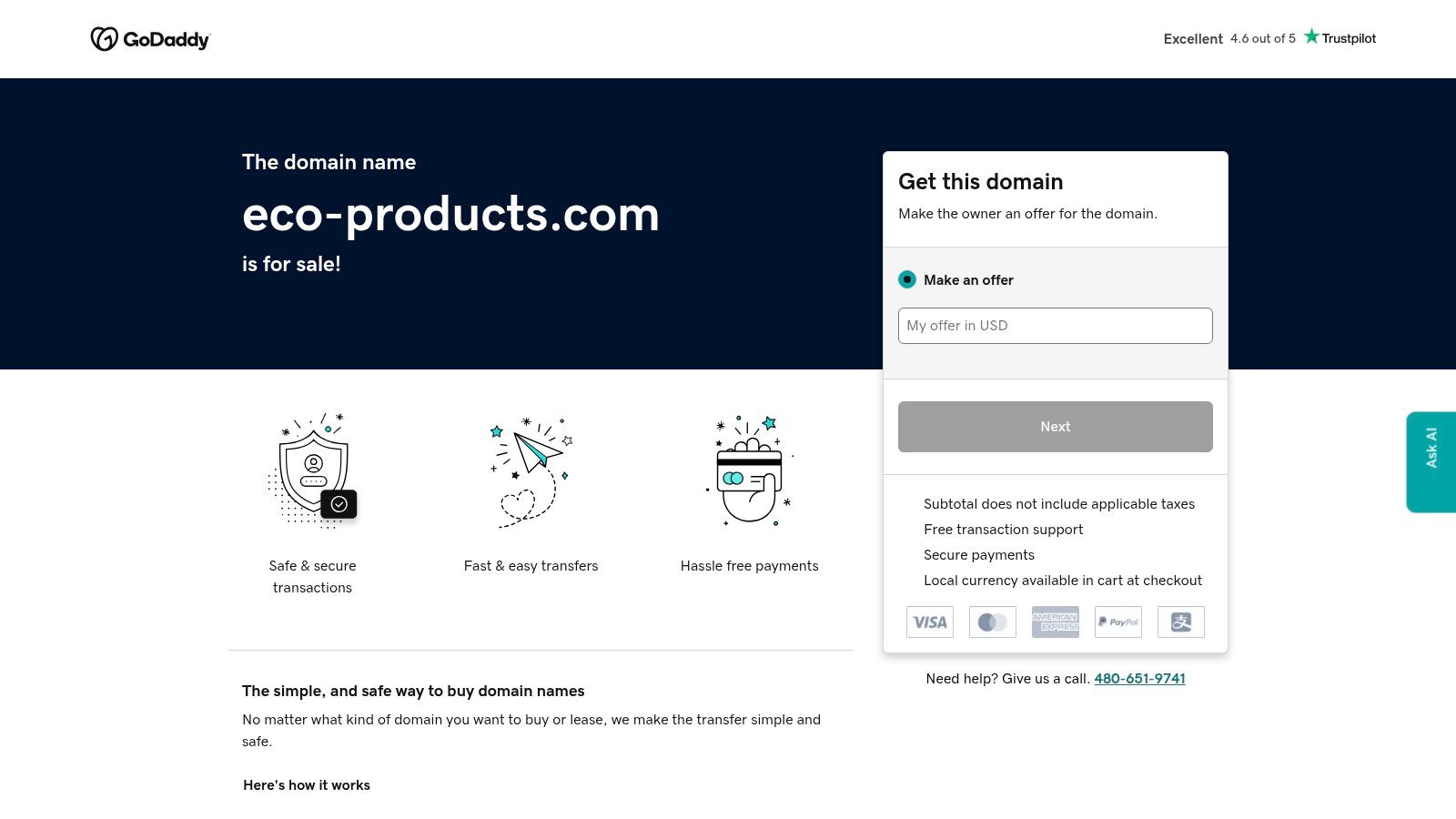
Eco-Products' commitment to sustainability goes beyond simply offering compostable products. They prioritize using renewable resources like corn-based PLA (polylactic acid) and sugarcane bagasse (the fibrous residue remaining after sugarcane stalks are crushed) in their manufacturing process. This reduces the reliance on petroleum-based plastics and minimizes the carbon footprint associated with traditional packaging. Many of their products also incorporate recycled paper with plant-based linings, further demonstrating their dedication to circular economy principles. For businesses striving for zero-waste operations, this focus on renewable and recycled materials makes Eco-Products a valuable partner.
One of the key strengths of Eco-Products lies in its extensive product range. Whether you run a small cafe, a bustling food truck, or a large institutional cafeteria, you'll find compostable packaging solutions tailored to your needs. Their offerings cover a wide spectrum of foodservice applications, including hot and cold beverages, takeout containers, portion cups, plates, bowls, cutlery, and more. This comprehensive selection simplifies the transition to compostable packaging, allowing businesses to consolidate their sourcing and streamline their operations. This wide range allows businesses to find compostable alternatives for almost every need, making the switch to eco-friendly packaging a more seamless process.
Eco-Products ensures its products meet rigorous compostability standards. They are certified compostable under ASTM D6400 and D6868, which signify that the products will break down completely into organic matter in commercial composting facilities. It's important to note, however, that these products require specific composting conditions not typically found in home composting systems. This necessitates partnering with a commercial composting service for proper disposal. While this might pose a slight inconvenience for individual consumers, it’s a crucial aspect of ensuring the packaging truly returns to the earth without leaving behind microplastics or harmful residues. Businesses implementing Eco-Products should clearly communicate these disposal requirements to their customers to encourage responsible composting practices.
While Eco-Products offers substantial benefits, there are some limitations to consider. Retail availability can be limited, making it more challenging for individual consumers to purchase their products. Their focus primarily lies in supplying businesses and institutions, resulting in bulk packaging options being more readily available. While this is advantageous for larger operations, it may not be ideal for smaller businesses or home users. Additionally, like many compostable materials, Eco-Products’ packaging can degrade with prolonged exposure to heat and moisture. Most products have a heat tolerance of up to 200°F, which is sufficient for many foodservice applications, but requires careful consideration when packaging extremely hot items.
Eco-Products' commitment extends beyond manufacturing. They provide valuable educational resources to businesses transitioning to compostable packaging. These resources cover topics such as composting best practices, proper disposal methods, and consumer education materials. This support is invaluable in helping businesses navigate the complexities of compostable packaging and maximizing the environmental benefits. This focus on education underscores Eco-Products' dedication to not just selling products but fostering a broader shift toward sustainable practices within the foodservice industry.
Pricing for Eco-Products varies depending on the specific product and quantity ordered. Contacting their sales team or authorized distributors is recommended for detailed pricing information tailored to specific business needs. Their website, https://www.eco-products.com, also provides further product information, resources, and contact details. By choosing Eco-Products, businesses demonstrate a commitment to environmental responsibility and contribute to a healthier planet, appealing to the growing number of consumers who prioritize sustainability.
4. BioPak Compostable Food Packaging
For businesses seeking truly sustainable food packaging solutions, BioPak stands out as a leader in the compostable food packaging market. Their commitment to environmentally responsible practices, coupled with a wide range of high-performing products, makes them a compelling choice for eco-conscious businesses and individuals. BioPak offers a comprehensive selection of compostable packaging options crafted from renewable plant-based materials, aiming to minimize environmental impact without sacrificing functionality. Whether you’re a restaurant owner, caterer, or simply an individual striving for a zero-waste lifestyle, BioPak provides a viable path towards a more sustainable future.
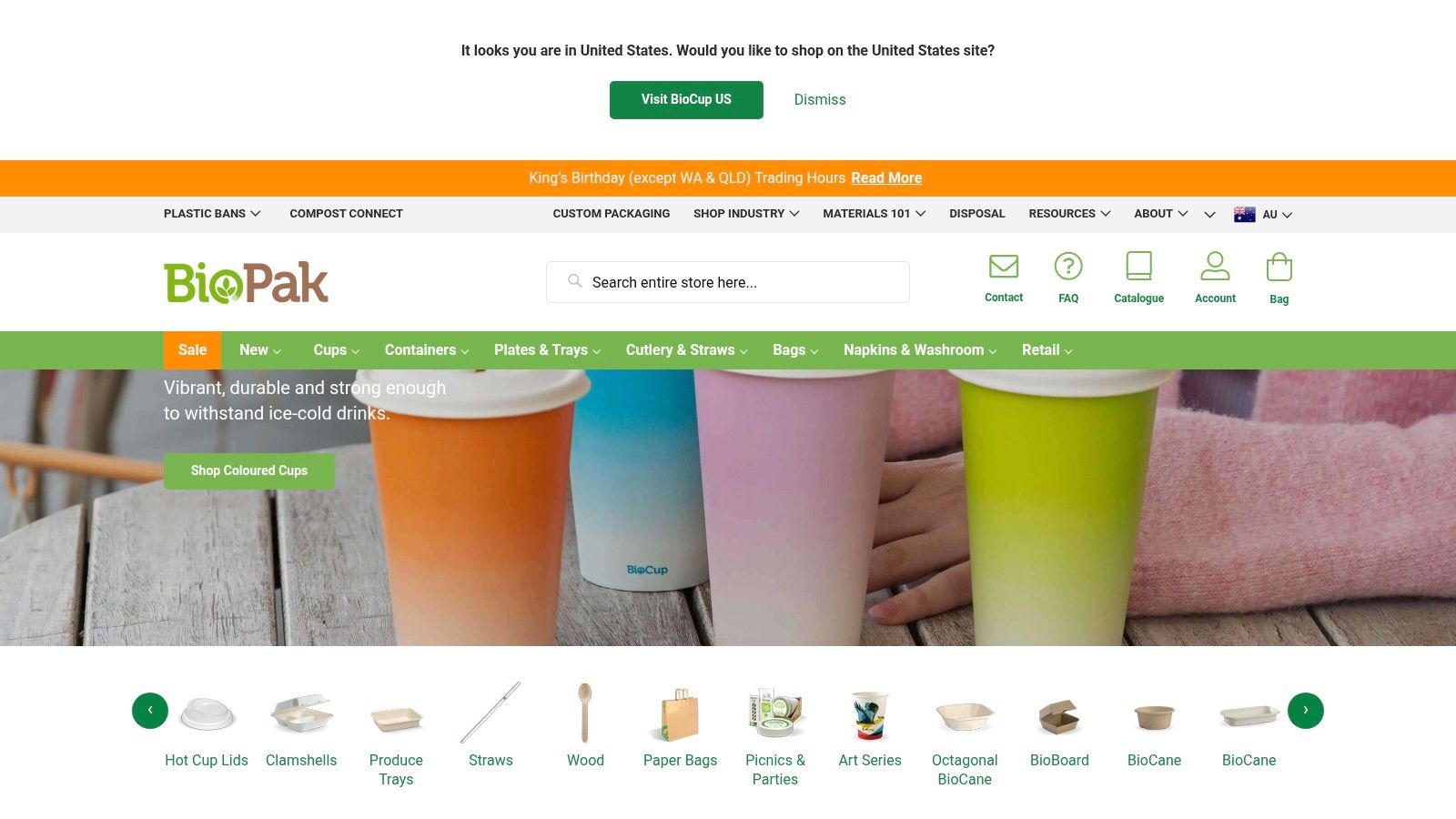
BioPak's product line encompasses a diverse range of items, catering to various food service needs. From takeaway containers and coffee cups to bowls, plates, and food wraps, they offer compostable alternatives for nearly every application. These products are primarily manufactured from rapidly renewable resources like bagasse (sugarcane fiber), bamboo, and cornstarch, ensuring a lower carbon footprint compared to traditional petroleum-based plastics. This commitment to sustainable materials aligns perfectly with the values of environmentally conscious consumers who are increasingly seeking out eco-friendly alternatives.
One of BioPak's key strengths lies in its rigorous adherence to international composting standards. Their products are certified to ASTM D6400 (US), EN13432 (Europe), and AS4736 (Australia), guaranteeing that they will fully biodegrade in commercial composting facilities. This is crucial, as not all "biodegradable" products are truly compostable. Many require specific conditions not available in typical home composting systems. BioPak's certifications provide assurance that their packaging will break down into nutrient-rich compost, leaving no harmful microplastics behind. This commitment to certified compostability is a significant advantage for businesses aiming to achieve zero-waste goals.
Beyond the materials themselves, BioPak emphasizes carbon-neutral manufacturing processes. This means that the company offsets the carbon emissions generated during production, further minimizing their environmental impact. This focus on carbon neutrality resonates with consumers concerned about climate change and seeking to support businesses actively working towards a more sustainable future. Furthermore, BioPak's packaging is designed for performance. Their products are oil and water-resistant, even without traditional plastic linings, ensuring that food stays fresh and contained. They also offer a range of colors and custom printing options, allowing businesses to maintain their branding and enhance their visual presentation while making eco-friendly choices.
However, there are a few considerations to keep in mind. BioPak's compostable packaging typically comes at a premium price compared to conventional alternatives. While the long-term environmental benefits are undeniable, the higher upfront cost can be a barrier for some businesses. Additionally, distribution can be limited in certain regions, potentially making access a challenge. Finally, and perhaps most importantly, BioPak's packaging requires access to commercial composting facilities for proper disposal. While the availability of these facilities is increasing, it's not yet universal. Businesses considering BioPak should research local composting options to ensure proper disposal and maximize the environmental benefits.
Implementing BioPak into your business is relatively straightforward. Visit their website (https://www.biopak.com) to explore their full product catalog and request samples. Their website also provides valuable resources on composting and sustainability. Consider conducting a waste audit to determine which conventional packaging items can be replaced with BioPak alternatives. Educate your staff and customers about the importance of proper disposal and the benefits of compostable packaging. By making a conscious shift towards sustainable practices, your business can reduce its environmental footprint and resonate with a growing segment of environmentally conscious consumers. BioPak provides the tools and resources to facilitate this transition towards a greener future for the food service industry.
5. Vegware Compostable Food Packaging
For businesses seeking a comprehensive and eco-friendly solution for their foodservice packaging needs, Vegware stands out as a leading provider of compostable alternatives. This UK-based company has carved a niche for itself by specializing in plant-based, compostable foodservice packaging designed to minimize environmental impact. Their commitment to a circular economy model, where waste is viewed as a resource, makes them a particularly attractive option for environmentally conscious businesses and consumers. Vegware offers a complete ecosystem of products, simplifying the transition to sustainable practices for food vendors of all sizes.
Vegware's product line is impressively diverse, encompassing everything from hot cups and takeaway containers to cutlery, napkins, and even takeaway bags. This wide range makes it a one-stop shop for businesses looking to replace all their traditional packaging with compostable alternatives. Materials used in Vegware's products include renewable and lower-carbon resources like corn, potato starch, and recycled paper. This focus on plant-based materials aligns perfectly with the values of those seeking organic, non-GMO, and sustainably sourced products. For those following a clean-eating lifestyle or interested in functional medicine and naturopathic principles, knowing their food is packaged in materials derived from plants offers an added layer of reassurance.
One of Vegware's key strengths is its adherence to the EN13432 European standard for compostability. This certification guarantees that their products will break down completely in industrial composting facilities alongside food waste, leaving no harmful microplastics behind. This commitment to certified compostability is crucial for businesses looking to genuinely reduce their environmental footprint and contribute to a zero-waste future. The fact that Vegware products can be composted along with food scraps simplifies the disposal process for consumers and businesses alike, promoting higher composting rates.
Vegware's products are designed to be functional as well as sustainable. Their hot cups and containers are heat resistant up to 85°C (185°F), making them suitable for serving a wide range of hot beverages and food items. This heat resistance, combined with good grease resistance, ensures that the packaging maintains its integrity and prevents leaks, crucial for a positive customer experience. However, it's worth noting that Vegware does have limitations with extremely hot foods, and businesses should consider this when choosing appropriate packaging for specific menu items.
While Vegware’s comprehensive range and commitment to compostability are compelling, there are a few factors to consider. The cost of compostable packaging is generally higher than traditional options, which can impact a business's bottom line. While exact pricing varies depending on the product and order volume, it's important to factor this into budgeting decisions. Additionally, while Vegware has a strong presence in European markets, its availability is more limited outside of Europe and the UK. Businesses in other regions might face challenges sourcing their products and may need to explore alternative compostable packaging suppliers.
Implementing Vegware into your foodservice operation is relatively straightforward. Simply replace your existing disposable packaging with Vegware equivalents. The company offers a range of sizes and styles to suit different needs. They also provide custom printing and branding options, allowing businesses to maintain their brand identity while showcasing their commitment to sustainability. This personalized touch can be a valuable marketing tool for businesses targeting eco-conscious consumers. For optimal composting, Vegware recommends partnering with a local commercial composting facility. Clear signage and instructions for customers can help ensure proper disposal and maximize the environmental benefits.
Compared to other compostable packaging options, Vegware excels in its broad product offering and focus on creating a complete ecosystem for foodservice businesses. While some competitors might specialize in specific items like cups or cutlery, Vegware’s comprehensive range simplifies sourcing and ensures consistency in materials and compostability standards across all packaging. This integrated approach makes the transition to sustainable practices smoother and more efficient for businesses. For those committed to reducing their environmental impact and appealing to a growing base of eco-conscious consumers, Vegware’s compostable food packaging presents a compelling and practical solution.
6. Sabert BePulp Compostable Containers
For businesses seeking a premium, eco-friendly solution for food packaging, Sabert BePulp compostable containers stand out as a strong contender in the world of sustainable foodservice. Made from a blend of sugarcane bagasse and bamboo fiber, these containers offer a compelling combination of performance, aesthetics, and environmental responsibility, appealing to businesses and consumers alike who prioritize both quality and sustainability. They present a viable alternative to traditional plastic packaging, aligning with the growing demand for compostable food packaging solutions.
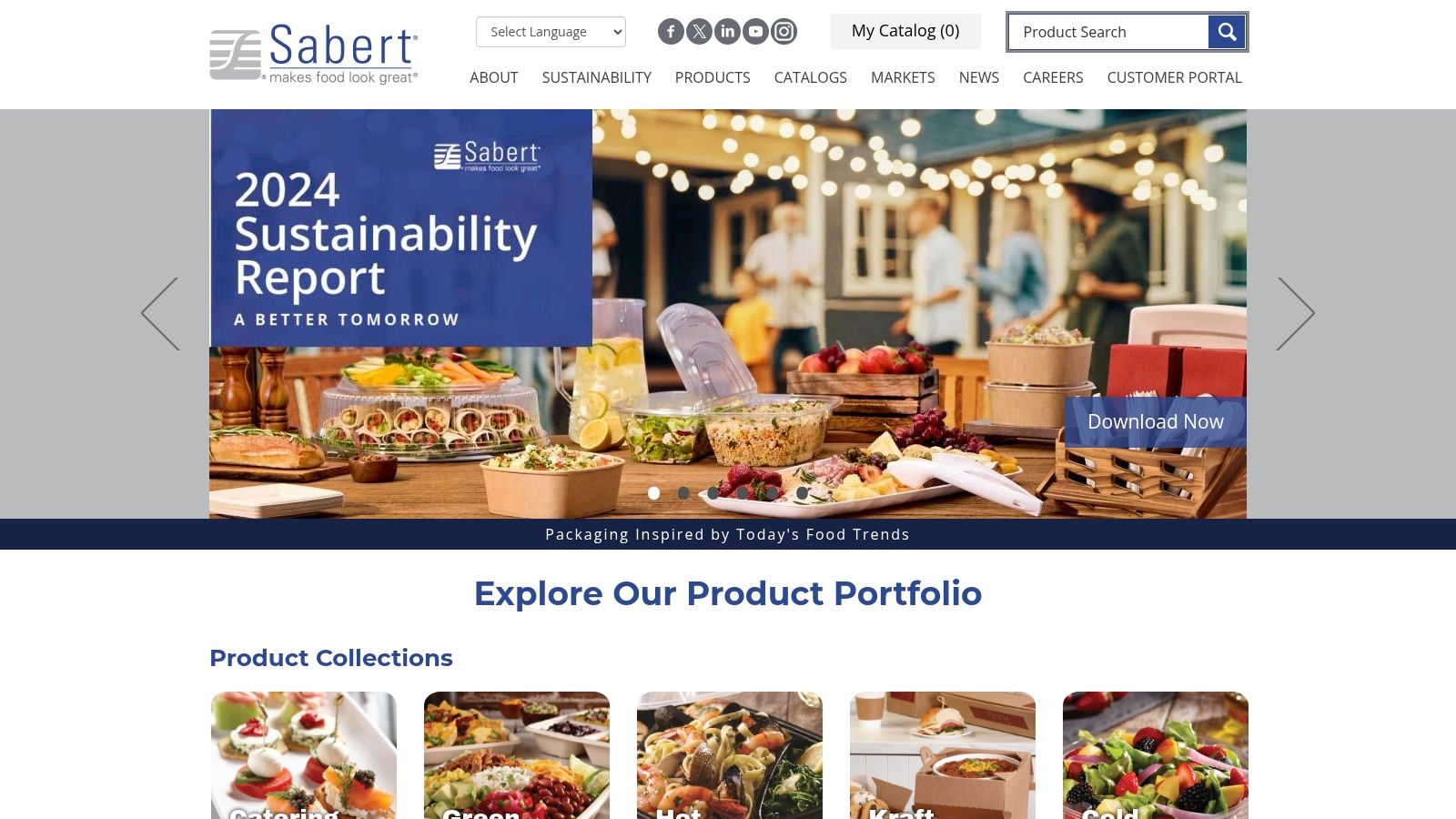
The BePulp line is designed to handle a wide range of food applications, from hot to cold dishes. This versatility makes them suitable for diverse food service settings, from restaurants and cafes to catering companies and meal delivery services. Whether serving steaming hot entrees or chilled desserts, BePulp containers maintain their structural integrity, preventing leaks and ensuring a professional presentation. This is a key feature for businesses focused on delivering a high-quality dining experience, even when utilizing takeout or delivery services. The leak and grease-resistant design is particularly beneficial for dishes with sauces or oily foods, maintaining the container's integrity and preventing messy spills.
Sabert emphasizes the premium nature of these containers, highlighting their clean lines and professional appearance. This makes them ideal for businesses that prioritize aesthetics and want to present their food in an attractive and eco-conscious manner. They are particularly well-suited for high-end food presentation, where the packaging plays a crucial role in conveying quality and brand image. Think organic meal delivery services, farm-to-table restaurants, or health-focused cafes. Customers seeking organic, grass-fed, non-GMO, and clean-eating options often appreciate the extra effort put into sustainable packaging, aligning with their values and lifestyle. The containers' elegant design enhances the perceived value of the food, creating a positive impression on environmentally and health-conscious consumers.
One of the significant advantages of Sabert BePulp containers is their certification under ASTM D6400 standards. This internationally recognized standard ensures that the containers are truly compostable in commercial composting facilities. This is crucial for businesses committed to zero-waste practices and appealing to customers who prioritize compostable food packaging. While backyard composting isn't suitable for these containers, partnering with a commercial composting service allows businesses to close the loop and divert food waste from landfills. This commitment to sustainability resonates with the growing number of consumers concerned about environmental impact.
While Sabert doesn't publicly list pricing, it's generally understood that BePulp containers are positioned at a higher price point than basic compostable alternatives. This premium pricing reflects the superior quality, performance, and aesthetic appeal of the product. However, businesses should weigh this cost against the value they provide in terms of brand image, customer satisfaction, and environmental responsibility. For many businesses targeting the health-conscious and eco-friendly market segments, the investment in premium compostable food packaging can be a worthwhile differentiator.
In terms of size options, Sabert BePulp containers offer a good variety, including clamshells, bowls, and compartmentalized designs, although the range may be slightly more limited compared to some competitors. Businesses should carefully consider their specific needs and menu offerings when selecting container sizes and configurations. Implementation is straightforward, simply integrating the containers into existing food service operations. Working with a commercial composting service will ensure proper disposal and maximize the environmental benefits.
Compared to other compostable options like molded fiber or PLA (polylactic acid) containers, BePulp offers a distinct advantage in terms of aesthetics and durability. Molded fiber, while compostable, often lacks the sleek and professional look of BePulp. PLA, while often used for cold food applications, may not have the same heat resistance and structural integrity as BePulp, making it less suitable for hot food items.
Sabert BePulp containers represent a significant step towards sustainable food packaging. By choosing these containers, businesses can demonstrate their commitment to environmental responsibility while providing their customers with a premium, high-quality dining experience. They appeal to the growing market of environmentally conscious consumers seeking organic, clean-eating, and zero-waste options, strengthening brand loyalty and contributing to a more sustainable future. For businesses looking to elevate their brand image and minimize their environmental footprint, exploring the Sabert BePulp line is highly recommended. Further information and specific product details can be found on the Sabert website: https://www.sabert.com.
7. Novolex Sustainable Food Packaging
For businesses seeking practical and cost-effective compostable food packaging solutions, Novolex offers a compelling range of options. Their commitment to providing sustainable alternatives for foodservice operations without compromising performance makes them a noteworthy contender in the compostable packaging market. They offer a variety of containers, bags, and wraps made from plant-based materials, catering to diverse foodservice needs. This focus on practicality and affordability makes Novolex a valuable resource for businesses transitioning to more environmentally friendly practices.
Novolex's dedication to sustainable practices is evident in its use of renewable resources like PLA (polylactic acid), a bioplastic derived from corn starch or sugarcane, and bagasse, a byproduct of sugarcane processing. These materials offer a compostable alternative to traditional petroleum-based plastics, reducing reliance on fossil fuels and minimizing environmental impact. Their two prominent product lines, EcoChoice and BioCorp, showcase this commitment, offering a variety of compostable food packaging options designed to meet the demands of various foodservice settings. EcoChoice provides a broad selection of compostable disposables, while BioCorp focuses on high-performance packaging solutions.
One of the key advantages of Novolex is their focus on providing cost-effective solutions. For budget-conscious businesses, especially those purchasing in volume, Novolex offers competitive pricing that makes the transition to compostable food packaging more accessible. This is particularly important for smaller businesses or those with tight margins, allowing them to embrace sustainable practices without significantly impacting their bottom line. Furthermore, their extensive distribution network across North America ensures widespread availability, streamlining procurement and reducing logistical challenges. This broad reach simplifies access to their products for a wider range of businesses.
Novolex's compostable food packaging caters to a variety of applications. From takeout containers and disposable cutlery to sandwich wraps and hot food containers, their product lines offer solutions for diverse needs within the foodservice industry. Restaurants, cafes, caterers, and food trucks can all benefit from their range of compostable options. For example, their PLA-based containers are ideal for cold foods like salads and sandwiches, while their bagasse-based containers are suitable for hot and greasy items. This versatility makes Novolex a one-stop shop for many businesses seeking comprehensive compostable packaging solutions.
Implementing Novolex's compostable food packaging is straightforward, designed for easy integration into existing foodservice operations. Their products are designed to function similarly to conventional packaging, minimizing disruption to existing workflows. However, it's crucial to educate staff and customers about proper disposal methods to ensure the packaging ends up in commercial composting facilities, maximizing its environmental benefits. Clear signage and communication are key to successful implementation.
While Novolex excels in affordability and accessibility, some limitations exist. Compared to specialized compostable packaging companies, their educational resources are less extensive. Businesses new to composting may require additional research or support to fully understand the process and its requirements. Additionally, while their product lines are diverse, they offer fewer premium or specialty options compared to some competitors. Finally, the availability of some compostable lines can be inconsistent, potentially requiring businesses to explore alternative solutions or adjust their ordering schedules.
Despite these limitations, Novolex remains a strong contender in the compostable food packaging market. Their commitment to providing cost-effective, readily available, and performance-driven solutions makes them an excellent choice for businesses seeking to reduce their environmental footprint. For those prioritizing affordability and accessibility, Novolex offers a valuable pathway towards more sustainable foodservice practices. Their website (https://www.novolex.com) offers a comprehensive overview of their product lines and sustainability initiatives. Choosing Novolex for your compostable food packaging needs signifies a conscious effort towards a greener future, resonating with environmentally conscious consumers and contributing to a healthier planet.
8. TIPA Compostable Flexible Packaging
The quest for truly sustainable food packaging has led to innovative solutions, and TIPA Compostable Flexible Packaging stands out as a frontrunner. This company offers a compelling alternative to traditional plastic films, focusing on compostable solutions that break down completely in home and commercial composting environments. For businesses and consumers seeking eco-friendly packaging options for food products, TIPA provides a pathway towards minimizing environmental impact without compromising on functionality. This makes it a strong contender in the world of compostable food packaging.
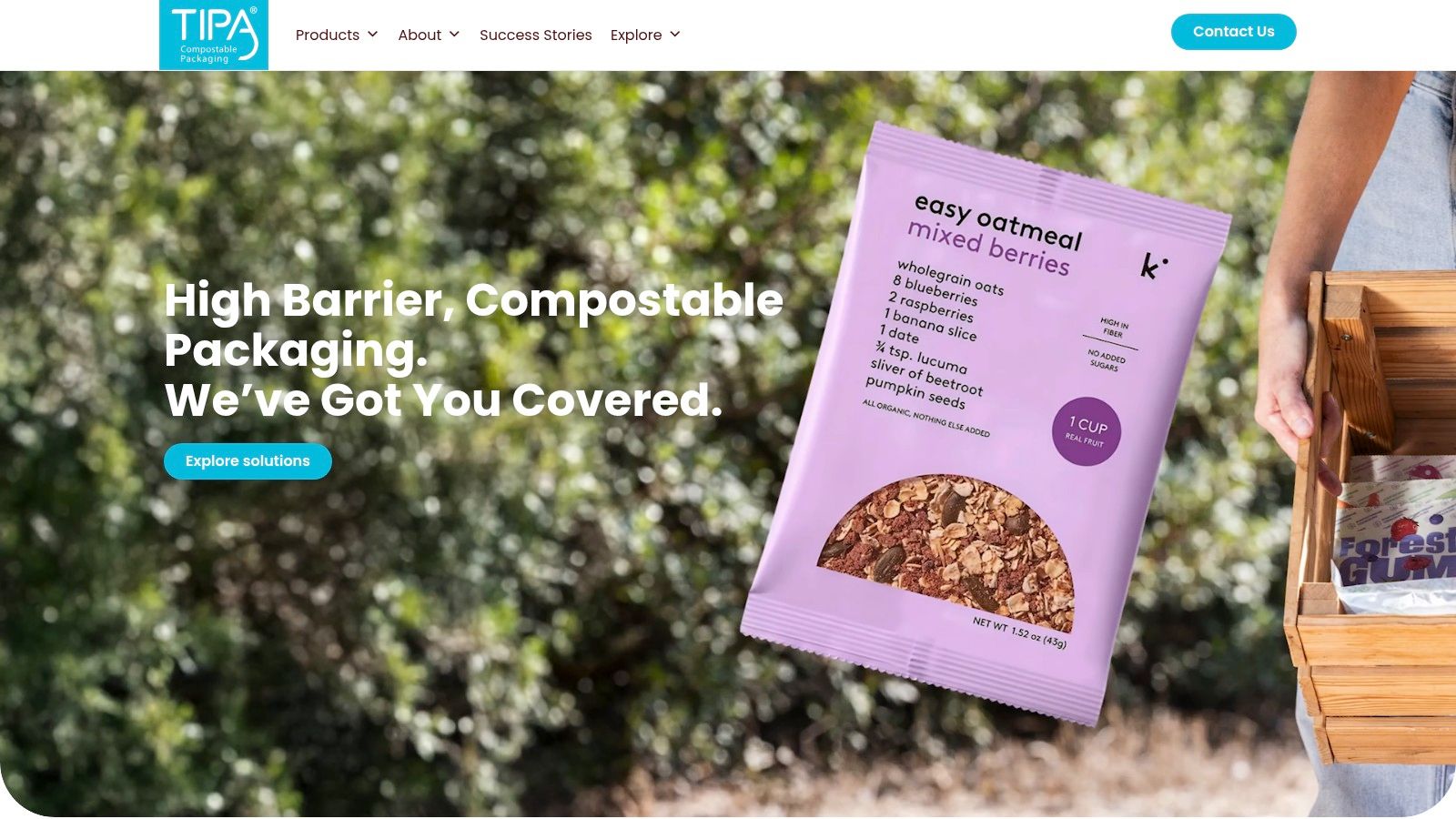
TIPA’s core offering revolves around flexible packaging films made from plant-based polymers and additives. These films are designed to mimic the functionality of conventional plastic while offering the crucial benefit of compostability. This means that instead of persisting in landfills or polluting the environment, TIPA packaging breaks down into nutrient-rich compost, effectively returning to the earth.
Practical Applications and Use Cases:
TIPA's compostable films cater to a wide range of food packaging needs. They are suitable for:
- Fresh Produce: Keeping fruits and vegetables fresh while reducing plastic waste. The films offer breathability to prevent spoilage.
- Snack Foods: Packaging chips, crackers, and other snacks in a compostable format, ideal for eco-conscious consumers.
- Dry Goods: Protecting items like pasta, grains, and dried fruit from moisture and pests.
- Confectionery: Offering a sustainable alternative for wrapping candies and chocolates.
- Coffee and Tea: Maintaining freshness and aroma while aligning with sustainable practices.
Features and Benefits:
- Home and Commercially Compostable: TIPA offers certifications for both home and commercial composting, providing flexibility for consumers and businesses. This aligns with various composting infrastructure setups.
- Customizable Barrier Properties: TIPA understands that different food types have unique preservation requirements. Their films can be customized to offer specific barrier properties against oxygen, moisture, and light, ensuring product freshness and shelf life.
- Compatibility with Existing Machinery: A significant advantage of TIPA’s films is their compatibility with existing packaging machinery. This simplifies the transition for businesses looking to adopt compostable packaging without major equipment overhauls.
- Clear and Printed Film Options: TIPA offers both clear films to showcase products and printed film options for branding and product information, catering to diverse marketing and aesthetic needs.
Pricing and Technical Requirements:
Specific pricing information for TIPA's products is generally available upon request directly from the company. As with many specialized materials, pricing can vary based on order volume, specific film requirements, and customization needs. Regarding technical requirements, the compatibility with existing packaging machinery simplifies implementation. However, businesses should consult with TIPA to ensure seamless integration with their specific equipment and processes.
Comparison with Similar Tools:
While other compostable packaging options exist, TIPA distinguishes itself through its focus on flexible films and high-performance compostability. Compared to some biodegradable plastics that might require specific industrial composting conditions, TIPA offers both home and commercial compostability, making it a more versatile solution.
Implementation Tips:
- Collaborate with TIPA: Engage with TIPA directly to discuss your specific packaging requirements and explore custom solutions.
- Conduct Trials: Test TIPA films with your products to ensure they meet your desired performance and shelf-life expectations.
- Educate Consumers: Clearly communicate the compostability of the packaging to consumers, encouraging proper disposal methods. Highlighting the environmental benefits can resonate with your target audience.
- Consider Certification: Ensure your chosen TIPA films carry the relevant certifications for your target composting system (home or commercial).
Pros and Cons:
Pros:
- Revolutionary technology for flexible packaging compostability.
- Home compostable options available.
- Maintains food safety and shelf life performance.
- Custom formulations for specific applications.
Cons:
- Higher cost than traditional plastic films.
- Limited production capacity and availability.
- Newer technology with less market penetration.
Website: https://www.tipa-corp.com
TIPA Compostable Flexible Packaging presents a significant advancement in sustainable food packaging. By offering genuinely compostable flexible films, TIPA empowers businesses and consumers to make eco-conscious choices without sacrificing product quality or packaging functionality. For those seeking truly compostable food packaging solutions, TIPA is a powerful tool to explore. Its ability to cater to various food types, coupled with its focus on minimizing environmental impact, makes TIPA a valuable asset in the journey towards a more sustainable future.
Compostable Food Packaging Comparison
| Product | Core Features/Packaging | User Experience & Quality | Value Proposition | Target Audience | Price Points |
|---|---|---|---|---|---|
| 🏆 Naked Pantry | 100% plastic-free; compostable paper, glass, metal ✨ | Fresh, organic, non-GMO ★★★★ | Subscription convenience 💰 | 👥 Eco-conscious & health-focused | Not publicly disclosed 💰 |
| WorldCentric Compostable Takeout Containers | 100% plant-based (bagasse, wheat straw, PLA); certified compostable | Grease & moisture resistant ★★★ | Bulk competitive pricing 💰 | 👥 Foodservice & bulk buyers | Moderate 💰 |
| Eco-Products Renewable & Compostable | Corn-based PLA, sugarcane bagasse; ASTM certified | Heat tolerant, consistent ★★★★ | Wide product range 💰 | 👥 Restaurants & institutions | Moderate 💰 |
| BioPak Compostable Food Packaging | Bagasse, bamboo, cornstarch; carbon-neutral process | Durable & certified ★★★★ | Premium, eco credentials 💰 | 👥 Sustainability-focused | Premium 💰 |
| Vegware Compostable Food Packaging | Corn, potato starch, recycled paper; EN13432 certified | Heat & grease resistant ★★★ | Circular economy focus ✨ | 👥 European foodservice | Higher 💰 |
| Sabert BePulp Compostable Containers | Sugarcane bagasse & bamboo fiber; ASTM certified | Leak & grease resistant ★★★★ | Premium look & feel 💰 | 👥 Premium food presentation | Higher 💰 |
| Novolex Sustainable Food Packaging | PLA & bagasse; multiple product lines | Reliable, cost-effective ★★★ | Budget-friendly 💰 | 👥 Foodservice, budget-minded | Competitive 💰 |
| TIPA Compostable Flexible Packaging | Plant-based polymers; home & commercial compostable films | Maintains shelf life ★★★★ | Flexible packaging innovation ✨ | 👥 Food brands needing flexible solutions | Premium 💰 |
Making the Switch to Compostable Food Packaging
Switching to compostable food packaging is a powerful way to minimize your environmental impact. From individual consumers to large businesses, the tools outlined in this article – Naked Pantry, WorldCentric, Eco-Products, BioPak, Vegware, Sabert BePulp, Novolex, and TIPA – offer a range of compostable food packaging solutions to suit diverse needs. Key takeaways include the importance of considering factors like cost, material type (PLA, bagasse, etc.), and the compatibility of the packaging with your specific food products. Whether you're packaging hot liquids, greasy foods, or dry goods, there's a compostable option available. Choosing the right tool depends on your individual circumstances, so carefully evaluate each option to find the perfect fit. For businesses, transitioning to compostable food packaging can enhance brand image and attract environmentally conscious customers. For individuals, it’s a tangible way to reduce waste and contribute to a healthier planet.
Implementing compostable food packaging requires careful consideration. Ensure access to proper composting facilities is available, as these materials require specific conditions to break down effectively. Additionally, educate yourself and your staff (if applicable) about proper disposal methods to avoid contamination of recycling streams. Remember, even small changes can have a significant collective impact on the environment.
Embracing compostable food packaging is more than just a trend; it’s a necessary step towards a sustainable future. Ready to take the next step in your zero-waste journey? Explore Naked Pantry, a platform dedicated to delivering groceries in reusable and compostable packaging, making sustainable choices easier than ever. Visit Naked Pantry to learn more and start reducing your environmental footprint today.
